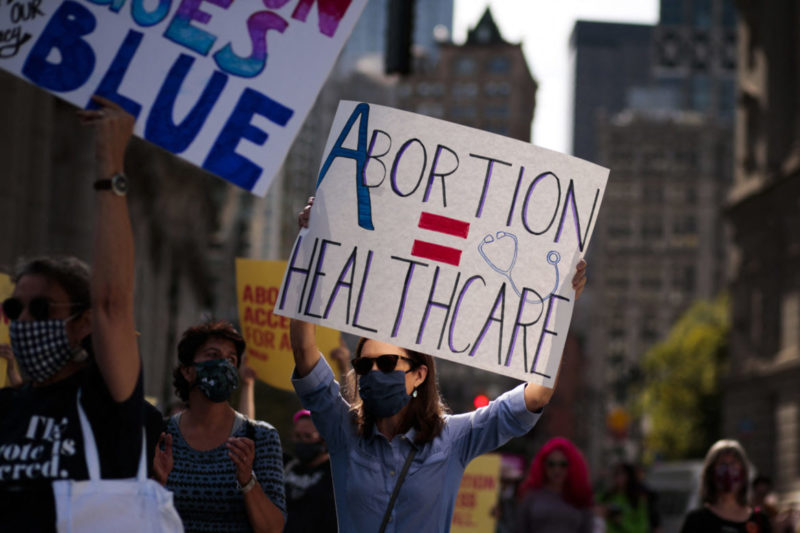As Abortion Restrictions Tighten, Patients Increasingly Turn to Independent Clinics
Independent clinics provide three out of every five abortions in the United States every year, a new report by the Abortion Care Network found.

With Roe v. Wade on the line at the Supreme Court and state lawmakers restricting access in new and increasingly radical ways, abortion providers and clinics have never been so vulnerable. The national conversation surrounding abortion access may often center on well-known mainstream organizations, but the reality of care looks different for patients on the ground.
Independent clinics are the heart of abortion care in the country, and a new report from the Abortion Care Network, a national association for independent abortion providers, illustrates how, as restrictions on access tighten, patients rely more and more on the critical care these clinics provide.
According to the report, independent clinics provide three out of every five abortions in the United States every year. Of the six states that have only one abortion clinic remaining, four rely on independent clinics: Mississippi, North Dakota, West Virginia, and Wyoming.
“Independent clinics like Women’s Health Center of West Virginia—the only clinic remaining in the entire state—are vital to the landscape of abortion care because we are embedded in our local landscape,” said Katie Quinonez, executive director of Women’s Health Center of West Virginia. “As the only abortion clinic in the entire state of West Virginia, the stakes could not be higher. … We know that no matter what happens with Roe, our community will be looking to us and local abortion funds to help them get the care they need. And, we’ll be there to answer the call.”
Patients who need later abortion care also rely heavily on independent clinics, which make up 60 percent of all clinics providing abortion care after the first trimester, and nearly 80 percent of all clinics providing abortion care at or after the 22nd week in pregnancy. The ACN report found that all clinics that provide abortion care after 26 weeks are independent.
In the wake of Texas SB 8, which bans all abortions after embryonic cardiac activity can be detected—around six weeks’ gestation—independent clinics are showing up for the patients flooding other states to seek care.
Rebecca Tong, co-executive director of Trust Women in Oklahoma City, said the clinic has “always seen patients from Texas.”
“But in September—after SB 8 went into effect—we saw ten times as many patients from Texas as in the month before; that number increased even more in October,” Tong said. “Everyone at Trust Women has stepped up to meet this challenge and provide abortions to as many people coming from Texas as we can.”
And for independent providers in Texas, like Whole Woman’s Health, attacks on abortion access are nothing new.
“We have taken down egregious attacks before, and we have the expertise and grit to take on the biggest ones yet, like Senate Bill 8,” said Amy Hagstrom Miller, the founder, president, and CEO of Whole Woman’s Health. “Independent providers like Whole Woman’s Health have learned to be innovative and nimble to survive.”
Independent providers are also on the forefront of ensuring patients have access to the full spectrum of abortion care, including both medication abortion and in-clinic abortion care. According to the ACN report, 71 percent of independent clinics offer patients both, compared to 49 percent of Planned Parenthood affiliates that offer patients a choice. What’s more, of the 306 independent clinics that operate in states where telemedicine abortion is legal, 34 percent provide telemedicine care.
“We hear every day from people who tell us they would not have been able to have an abortion if telemedicine was not an option,” Dr. Jamie Phifer, medical director and founder of Abortion on Demand, said. “Whether it’s because of distance to a clinic, busy work schedules, or caring for young children at home, telehealth can help overcome these obstacles.”
Independent providers are the backbone of abortion care in the United States, but they’re also some of the hardest hit by restrictions and bans. According to the ACN report, over the last decade the number of independent clinics nationwide has decreased by 30 percent. Twenty clinics have closed this year, and a whopping 113 have shuttered since 2016.
The fight for abortion access is more urgent than ever, and ACN’s report makes clear that the future of abortion access in the United States depends on independent clinics and providers. The report identifies key areas for advocacy, including ending abortion restrictions, repealing insurance coverage bans on abortion, and lifting regulations on medication abortion.
Beyond that, they urge advocates to raise awareness of the vital role independent clinics play in abortion care. They suggest donating or volunteering with a local abortion clinic, and, on a personal level, showing support for the people in your life who provide abortions and the people who have them.
